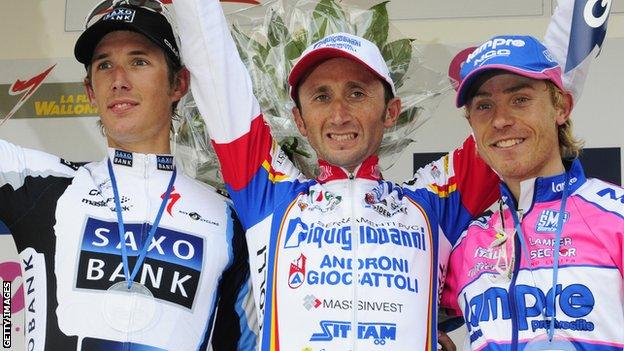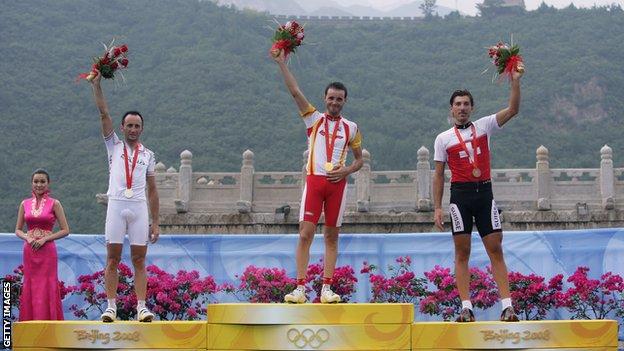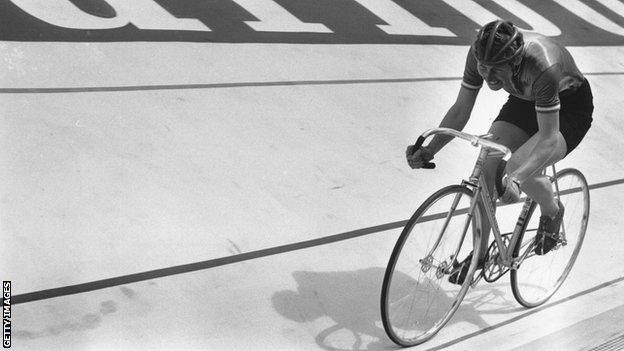
At 50, some evaluate what they did in their lives; others think of what lies ahead.
Others fully live in the present – and Davide Rebellin is one of those. Sitting in his team’s headquarters in Padua, north-east Italy – surrounded by jerseys from his career hung proudly on the wall – he enthuses about the characteristics of modern cycling, the secret of his longevity and what still lies ahead for him.
Cycling has changed a lot in the last decades. The overall standard has increased and races are hard-fought from the first to the last pedal stroke; athletes follow iron training regimes and nutrition tables; dieticians, psychologists and mental coaches are part of the game; data is collected and evaluated in real time and sport directors dictate strategies, which leaves less room for riders’ intuition.
Rebellin, who turned 50 a few days ago, knows it all. Now at the solid UCI Professional team Work Service-Marchiol-Vega, his journey has taken in teams from Croatia, Kuwait, Tunisia, Hungary and Cambodia.
The Italian, who has a storied past at prestigious outfits such as GB-MG, Polti, Française des Jeux, Luquigas and Gerolsteiner, can look back at 30 years in the pro-peloton and has lived these changes in his own skin.
“Races have become very nervous, you can’t relax at any time, not even for a second. Technology has moved forward leaps and bounds, from wheels to aerodynamics and clothes.
“Nutrition is another topic. Years ago some riders would start the season with some extra kilos, now they are all in perfect shape. Cycling has become even more draining.”

The flip-side of a youthful peloton
And so the age of the competitors has changed, with riders taking part in Grand Tours in their very early 20s – something that would never have happened 20 years ago. It gives good opportunities for champions like Tadej Pogačar, Egan Bernal and Remco Evenepoel, but it hides a flip side too.
“The pace is extreme, training sessions more specific and testing from the mental point of view, nutrition has become an obsession. Look at Tom Dumoulin: he’s back now [having taken a seven-month career sabbatical], but you can lose important talents along the way. At 25 you must hit the peak of your career already. I did my best after I turned 30.”
But if cycling has become less fun and more stressful, what urges an extremely successful 50-year-old rider to continue?
Rebellin was the first athlete to win all three Ardennes Classics – the Amstel Gold Race, Lieges-Bastogne-Lieges and Fleche Wallonne within a week – yet with a total of over 60 professional successes, he still has the excitement of a child.
“It’s all about passion. To train hard and follow a specific programme is normal for me. I am a bit worried about what will come next, because my body still demands it. Desire is there and I will continue as long as I am competitive and enjoy myself. When my time comes I will quit.
“People appreciate me, even more than in my winning days, because they know how hard it is against younger riders. I even raced with some of my old competitors’ sons. I receive a lot of support from amateurs on social media, they praise my passion and longevity, I know I am a role model and that motivates me.
“I am a lucky man because I do what I love most; riding has never been a job. I get up in the morning and I go out on my bike, I don’t have fixed working hours and I am still living my dream. I won races I dreamt of as a child and I am still here, it’s great.”
Life as a professional is not easy though, especially at 50. Your body is not the one you had at 20 and demands different workloads; goals cannot be the same, as well as the teams you ride for.
“I have a lot of experience and I know myself. I don’t have a trainer or a nutritionist; I know how to train and what to eat. My training method is the one I used in my early days, albeit a few changes. With age increasing, what you lose most is strength; I have always had stamina and I don’t need to train that with 50.
“I do spend six or seven hours on my bike, but that’s a pleasure. I train my explosiveness, with specific work on the road as well as in the gym. In other times you would train first and find your shape during the races, now you have to be fully fit before you put a number on your back.
“Recently I finished 10th at the Adriatica-Ionica and at the Sibiu Tour in Romania. My goal is always to do my best, especially when the race suits me, but that can’t be winning the race at my age. What really counts is enthusiasm, motivation and will.
“For years I have been one of the men to beat. That perspective has changed, but it hasn’t been a painful process. Pressure mainly comes from oneself; my competitive spirit is untouched, but I am more aware.”

| Beryl Burton (1937-1996) | British female cyclist, above, who won the World Road race title twice, and five track cycling golds, was still racing at 48 |
| Kazuyoshi Miura (1967-) | Japanese footballer still going at 54 – played for top clubs in Brazil and Europe |
| Mario Andretti (1940-) | American racing driver who won the F1 and IndyCar titles among many other accolades. Was trying to win Le Mans aged 60 in 2000. |
The secret to longevity
The secret of Rebellin’s longevity is no secret at all, but the result of natural talent, passion and a balanced lifestyle.
“Love and passion are key in training and racing, in nutrition and sleep. My wife and I live a simple life at home; we get up at 6:30, do some muscle toning, get a good breakfast and then I am out on my bike at around 9:30. I eat a light meal when I am back, then we take dinner at around six and go to bed at nine.
“We feel the benefits of such a regular life. I am almost vegetarian, but it’s hard to keep up with it in hotels. I haven’t been eating any red meat for years and I have been living gluten free since 1997. I have a balanced nutrition plan, I recover faster and I feel better. Food is the fuel of your motor.”
He has also had his disappointments, and dealing with those – notably when he was stripped of the Olympic road race silver medal after a positive dope test – help him prepare for the next step of his life.
“I had some setbacks in my career, such as the revocation of the silver medal I won at the Beijing 2008 Olympics. I was cleared by the Italian Justice [department]; I feel that medal belongs to me although it is not with me. That was a turning point in my career; I was suspended for two years, but it was as if it had been seven or eight.
“No big team wanted me anymore, organisers avoided me. It was a difficult spell, although I kept training as if I would go back to racing the next day. When I resumed in 2011, I started winning from the off. I was 33 but I really hit my peak.
“Everyone knew my worth, but no-one wanted to give me a chance; this also pushed me to carry on and prove them wrong. I won the Giro dell’Emilia at 44, but that didn’t really change anything.
“Today I like to help my younger team-mates too; I am a sort of sport director within the peloton. I think less of my own result and put myself more at their service, making the pace and breaking the wind.”
Rebellin seems to be well sorted for the future, too. “It’s all about passion. I am a lucky man because I do what I love most.”
Following this interview, Rebellin crashed during the Memorial Marco Pantani race in Italy on 18 September, suffering leg fractures. He is expected to undergo surgery in the coming days.


